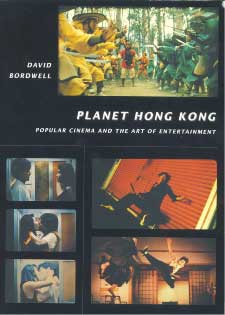

Bordwell is a Professor of Film Studies at the University of Wisconsin and he has written a number of books on film and is considered one of the eminent authorities in the field. As he explains in the introduction, in the early 1990’s he became interested in HK film and at some point he “dived in” completely. Though he admits to having seen less than 400 HK films, his background in film and his academic approach to research and writing allows him to bring an analytical and fascinating perspective to the subject matter.
The theme of the book is a bit difficult to pinpoint. Bordwell states “What follows, then is an essayistic attempt to understand the interplay of art and entertainment in one popular cinema” and that it is an exploration of “industry background, production practices, and above all filmic structure and style”. But Bordwell also goes on to say that he is writing about aspects of HK cinema that interests him – and for the most part it should also interest fans of HK film.
In nine chapters/essays Bordwell discusses both what makes HK cinema distinctly “Hong Kong” and also what differentiates it from the cinematic product from the West. Some of the most interesting information to me was about the film industry/process itself – or how movies actually get made in HK. This takes in the financing, the scripts, the shooting, the post-production and the marketing of the films.
Though certain well known personalities are addressed – Bruce Lee, Jackie Chan, John Woo, Tsui Hark, Wong Jing, King Hu – it is usually done so from the perspective of his overall analysis of HK film and so even for a subject as written about as John Woo, Bordwell has something fresh to say. On the other hand, many of his film choices that he uses as examples of aspects of filmmaking are quite intriguing - Once Upon a Time in Triad Society, Gunmen, Task Force, Boys are Easy - but he also devotes an entire chapter to Chungking Express.
This book is simply a wealth of information
– nearly every page has something interesting in it – and it is one of
the few books to treat HK film as a serious subject of film study. One
possible criticism that could be levied against the book though is that
for the most part it ignores the dramas, melodramas and comedies of HK
film – and tends to define HK film in terms of films that are action/fantasy/movement
oriented. Still, there is some absolutely great stuff here and this book
has to be added to the list of essential reading on HK cinema.